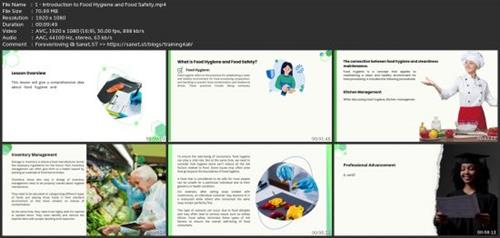Food Safety Training Certificate: Best Practices & Standards

[center]Published 10/2024
MP4 | Video: h264, 1920x1080 | Audio: AAC, 44.1 KHz
Language: English | Size: 1.12 GB | Duration: 2h 0m
[/align]
Food Safety Training Certificate Comprehensive Guide to Food Safety Management System for Risk Reduction and Compliance
What you'll learn
Understand the fundamental principles of food hygiene and safety practices.
Learn how to identify and prevent common foodborne illnesses and contamination.
Gain knowledge of the food safety rating system in the United Kingdom and its importance.
Develop skills to implement effective food safety management systems (FSMS) in various settings.
Understand the key aspects of Natasha's Law and its implications for food labeling.
Learn best practices for maintaining hygiene during food preparation, serving, and handling.
Master the procedures for setting up and managing a safe food business environment.
Identify and apply control measures to prevent food hazards.
Learn how to conduct food safety audits and manage food recalls efficiently.
Gain the skills needed to ensure compliance with food safety laws and regulations.
Requirements
Basic understanding of food handling or interest in food safety.
No prior knowledge of food safety regulations is required.
Access to a device with an internet connection to complete the online course.
Willingness to learn about food hygiene practices and compliance standards.
Description
In an era where food safety is a critical concern, businesses must adhere to stringent hygiene standards to protect consumers and comply with regulations. The global food industry is forecasted to exceed $12 trillion by 2025, creating an ever-growing demand for professionals equipped with expertise in food safety and hygiene. Maintaining effective food safety management systems is not only a regulatory requirement but a vital aspect of safeguarding public health. This presents abundant career opportunities for those with the right skills in food safety and compliance.The Food Safety Training Certificate: Best Practices & Standards is designed to address the growing need for skilled professionals in the food industry. Whether you are involved in food production, handling, or management, this course will equip you with comprehensive knowledge and practical skills to ensure compliance with hygiene and food safety regulations. The global emphasis on preventing food safety hazards is rising, making the role of certified food safety professionals more critical than ever before.The Food Safety Training Certificate: Best Practices & Standards course offers an in-depth exploration of food safety management systems, ensuring that participants can mitigate food safety hazards effectively. This course is essential for anyone responsible for overseeing food safety in any segment of the food industry, from manufacturing to retail.Understanding and implementing food safety practices is crucial for reducing contamination risks and ensuring that businesses remain compliant with national and international regulations. By learning to implement effective food safety management systems, you will ensure that your business meets regulatory standards while fostering consumer trust.Upon completing this course, you will master essential food safety practices to minimize contamination risks and be equipped to implement and maintain effective food safety management systems. You will gain a comprehensive understanding of both global and local food safety hazards and regulations, along with the skills needed to conduct internal audits and assessments. The course will help you improve food hygiene standards and manage the risks associated with foodborne illnesses. Additionally, you will earn a recognized certification, enhancing your credentials in the food safety sector.Throughout the course, you will cover the fundamental principles of food safety and hygiene across various sectors, focusing on identifying and preventing hazards at different stages of the food supply chain. The course will guide you through the implementation and maintenance of food safety management systems and equip you with practical skills to ensure compliance with global food safety standards. Additionally, it emphasizes the importance of effective sanitation, proper food hygiene practices, and staff training. You will also learn how to protect your business and customers from the risks associated with inadequate food safety practices.Maintaining high food safety standards is not only a legal requirement but also a significant driver of business success. Adopting an effective food safety management system ensures that your business complies with regulatory bodies, reduces the risk of product recalls, and strengthens consumer trust. Businesses with robust food safety protocols in place are better positioned to protect their brand reputation, minimize legal liabilities, and ensure continued growth in a competitive market.Why You Should Take This Course:Compliance with Regulations: Learn how to meet national and international legal requirements in food production, processing, and handling, ensuring your business stays compliant.Reduce Food Safety Hazards: Understand strategies to prevent contamination, maintain product integrity, and minimize the risk of foodborne illnesses.Boost Career Prospects: Gain a recognized certification in food safety, qualifying you for roles in food safety management, auditing, and quality control.Protect Public Health: Acquire skills to implement best practices in hygiene and food safety, reducing the risk of outbreaks and protecting consumers.Increase Business Credibility: Enhance your organization's reputation by demonstrating a commitment to maintaining high food safety standards.Cost Efficiency: Implementing robust food safety protocols can help reduce waste, avoid costly recalls, and improve overall operational efficiency.Industry Growth Opportunities: With the rapid expansion of the food industry, certification in food safety opens doors to career advancement, job security, and positions in a variety of sectors.Career Pathways:Food Safety Manager: Oversee the development, implementation, and monitoring of food safety management systems in various food production environments.Quality Assurance Specialist: Ensure that all food products meet the required safety and quality standards, from manufacturing through to distribution.Compliance Auditor: Conduct inspections and audits to verify adherence to food safety regulations, hygiene practices, and management systems.Food Safety Consultant: Offer expert advice on setting up and maintaining food safety management systems, helping businesses improve their standards.Regulatory Affairs Specialist: Ensure that food safety regulations are understood, implemented, and followed across all business operations, from production to retail.Production Supervisor: Lead production teams with a focus on maintaining safety and hygiene protocols, ensuring the efficient and compliant operation of food production lines.Training Coordinator: Develop and deliver training programs on food safety practices, helping staff across all levels understand and follow safety protocols.Enroll Now!Take the first step in securing a promising career in food safety by enrolling in the Food Safety Training Certificate: Best Practices & Standards. By joining this course, you will gain the expertise to maintain high standards of food safety, protect public health, and position yourself as a valuable professional in a growing industry.With the knowledge and certification from this course, you'll be equipped to ensure that businesses comply with food safety laws, minimize risks, and thrive in today's competitive market. Don't miss this opportunity to enhance your skills and advance your career in food safety-Enroll today and become a certified expert in food safety!
Overview
Section 1: Introduction to Food Safety
Lecture 1 Introduction to Food Hygiene and Food Safety
Lecture 2 Food Safety Laws
Lecture 3 General Food Safety Rating System in the United Kingdom
Section 2: Understanding Food Hazards
Lecture 4 Microbiology in Food Safety
Lecture 5 Food Poisoning, Contamination and Illness
Lecture 6 How to Prevent Food Hazard
Lecture 7 Control Measures for Food Hazard
Section 3: Food Labeling and Compliance
Lecture 8 Natasha's Law for Labelling Foods
Lecture 9 Recall of Unsafe Foods
Section 4: Hygiene Practices in Food Handling
Lecture 10 Hygiene and Safety in Food Preparation
Lecture 11 Hygiene for Food Serving and Food Handlers
Lecture 12 Hygiene and Food Safety as a Food Supplier
Section 5: Setting Up and Auditing Food Safety
Lecture 13 How to Set up the Premises for a Food Business
Lecture 14 Food Safety Management System
Lecture 15 Food Safety Audit
Food Safety Auditors and Inspectors,Food Handlers,Food Service Professionals,Retail and Wholesale Food Employees,Health and Safety Officers,Regulatory Agency Employees,Students and Trainees,Business Owners and Entrepreneurs,Restaurant Managers,Food Production Workers,Health Inspectors,Food Safety Compliance Officers,Food Safety Consultants,Food Distribution Managers,Quality Control Inspectors,Community Nutritionists
Screenshots

Say "Thank You"
rapidgator.net:
https://rapidgator.net/file/b57f50355735e41aae907e4f84d2e910/favnk.Food.Safety.Training.Certificate.Best.Practices..Standards.part1.rar.html https://rapidgator.net/file/148d827c020f5091ab6abf174078ec8c/favnk.Food.Safety.Training.Certificate.Best.Practices..Standards.part2.rar.html
ddownload.com:
https://ddownload.com/htvwmdx69uos/favnk.Food.Safety.Training.Certificate.Best.Practices..Standards.part1.rar https://ddownload.com/2gt62qqu7mrj/favnk.Food.Safety.Training.Certificate.Best.Practices..Standards.part2.rar

